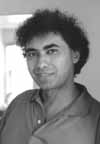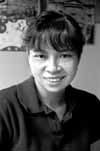

|
Our question this time was directed to some of McGill's younger professors and although our respondents hail from four different disciplines and three separate faculties, their answers are strikingly similar.
What is the single most difficult thing associated with beginning a career as an academic?

Avi Chaudhuri, assistant professor, Department of Psychology
|
There is a sudden transformation from being a full-time researcher to a new life where the actual conduct of research must compete with several other responsibilities. During the graduate school and postdoctoral years, we learn to do research and spend much of our time trying to think of clever and creative solutions to a scientific problem. A new academic must learn to balance a vigorous research agenda with new responsibilities in grantsmanship, teaching, and other professional duties. And yet, the contemporary approach to training an academic is based entirely on research with little emphasis on those other skills  skills that suddenly become all too important in determining if that individual will even continue to do research. skills that suddenly become all too important in determining if that individual will even continue to do research.
|

Peter Grütter, assistant professor, Department of Physics
|
Time management. Developing a research program, applying for grants, starting a research group, teaching undergraduates, finding out about the peculiarities and the politics of the academic institution, networking, settling down in a new city, getting a life, braving -30 degrees (I arrived from a somewhat milder part of the world in February 1994), making the transition to a new life-style with kids, responding to requests by the press  all at the same time all at the same time  is exciting and challenging. Most of the above issues apply to any career. Particular to academia in North America is the fact that hierarchies are very flat. Thus, when starting an academic career, one instantly becomes CEO of a company "producing" research that has to be competitive on an international scale. At the same time, one has to cooperate with many other individuals to provide a quality "service" is exciting and challenging. Most of the above issues apply to any career. Particular to academia in North America is the fact that hierarchies are very flat. Thus, when starting an academic career, one instantly becomes CEO of a company "producing" research that has to be competitive on an international scale. At the same time, one has to cooperate with many other individuals to provide a quality "service"  undergraduate teaching. Setting priorities and allocating the appropriate amount of time easily becomes the single biggest challenge. undergraduate teaching. Setting priorities and allocating the appropriate amount of time easily becomes the single biggest challenge.
|

Anne Hale, assistant professor, Faculty of Management, and associate dean, BCom program
|
Making the transition from being a doctoral student to an assistant professor means taking on a whole new set of responsibilities. Obviously, you have all the standard challenges associated with starting any new career. You have to become familiar with your environment, prepare the courses you will teach, figure out the computer system (which is invariably different from the one you used as a graduate student), and meet all of your new colleagues. The real challenge for new tenure-track faculty, in my opinion, is learning to find a balance, in terms of time allocation, between the three aspects of the job: teaching, research and administrative and community responsibilities. Doctoral students lead somewhat sheltered lives in that they are not as involved in teaching and administrative activities. Learning how to manage time effectively, therefore, is one of the challenges facing incoming assistant professors.
|

Jessie Tzeng, assistant professor, Department of Sociology
|
Well, I think the most difficult thing is that I don't have enough time to do my own research. I only had one course off in my first semester at McGill. My regular teaching load is two courses per semester, plus administrative work (committee work for the University and department and student advising). It is extremely difficult for a junior faculty (without many resources) to build a track record in research when there is no time left after teaching and administrative work.
|
|

|




